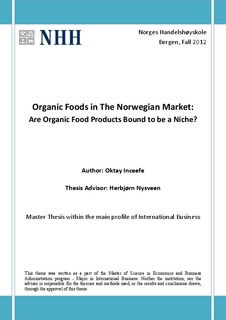Organic foods in the Norwegian market : are organic food products bound to be a niche?
Abstract
After the first and second Industrial Revolution that took place from mid-18th to mid-19th century, farming practices all around the World have changed from a natural baseline to an industrialized one. To get bigger yields and feed the ever increasing population, this meant the use of synthetic pesticides and fertilizers fallowed by genetic modification of crops. However, last decades have seen criticism focused on industrialized farming practices as the rising issues of global warming and environmental preservation became important. Today, all around the World there is an increasing trend of going back to old organic farming practices to preserve environment and to mitigate health risks associated with conventional farming.
Therefore, the purpose of this master thesis is to analyze the Norwegian organic food market and its practices to determine if organic foods can occupy a significant market segment that goes beyond a small niche, and if Norway has the dynamics to house a profitable organic segment in the upcoming years without significant government support.
To accomplish this tall task, this thesis first establishes background analysis of organic food development in the context of health and environment, followed by the literature review with a focus on consumer attributes and green marketing. After establishing the baseline for further analyses, the author focuses on Norwegian organic food industry and the Norwegian consumer profile analyses. On the final part, these findings are put as guidelines for organic food marketing and the thesis is finalized by presenting the ICA case, I love Eco assortment, as it exhibits the best practices for organic food marketing in Norway. The finalized focal findings of this study suggest how organic brands and producers of today should alter and enhance their marketing strategies to communicate the organic message and its benefits better.
